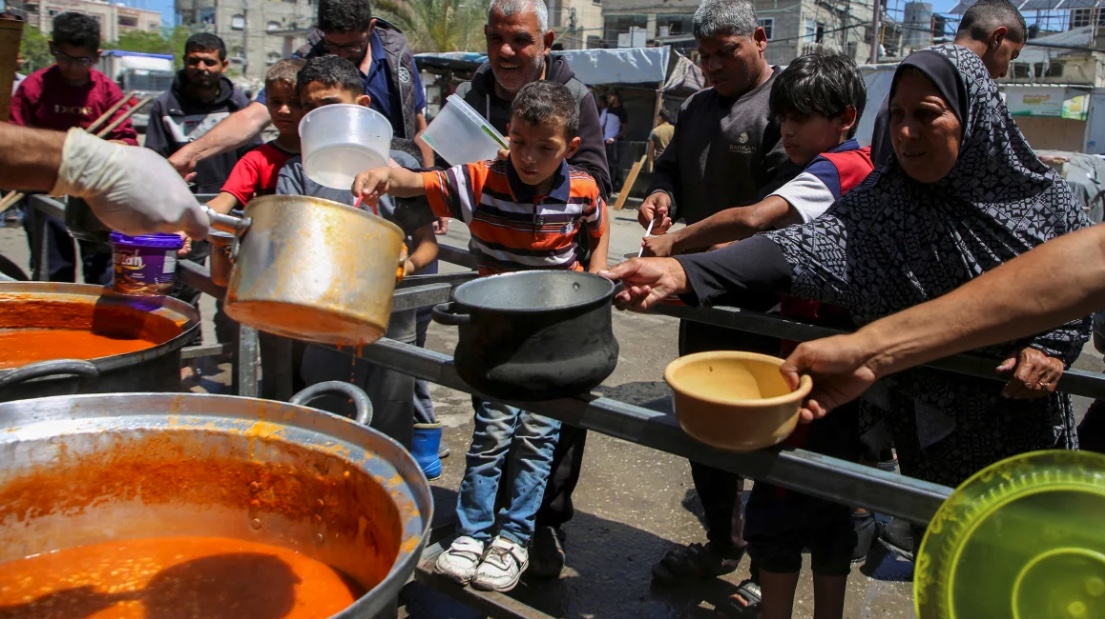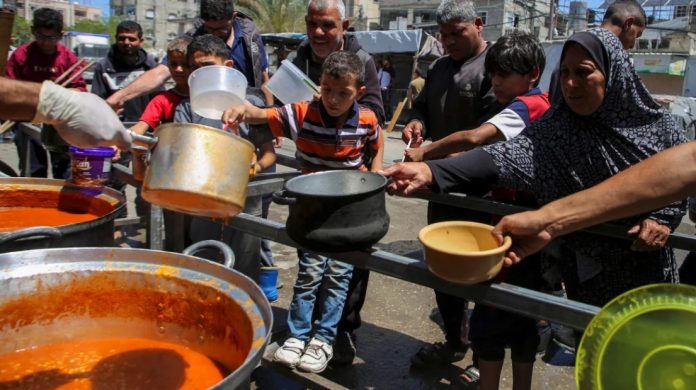เมื่อวันเสาร์ที่ 15 มิถุนายน มีปฏิบัติการตามเส้นทางทางตอนใต้ของฉนวนกาซาเพื่ออำนวยความสะดวกในการแจกจ่ายความช่วยเหลือ แต่ย้ำว่าการสู้รบในและรอบๆ ราฟาห์จะดำเนินต่อไปไม่ลดลง การหยุดชั่วคราวซึ่งเริ่มในวันเสาร์ จะเกิดขึ้นทุกวันตั้งแต่เวลา 8.00 น. ถึง 19.00 น. ตามเวลาท้องถิ่นจนกว่าจะมีประกาศเพิ่มเติม ทำให้รถบรรทุกสามารถเคลื่อนตัวจากทางข้าม Kerem Shalom ซึ่งเป็นจุดเริ่มต้นหลักสำหรับความช่วยเหลือไปยังฉนวนกาซาตอนใต้ ขึ้นไปตามถนน Salah al-Din และไปทางเหนือ ตามข้อมูลของ IDF การรณรงค์ของอิสราเอลในฉนวนกาซาส่งผลให้เกิดวิกฤตด้านมนุษยธรรม โดยมีความช่วยเหลือที่ค้างอยู่จำนวนมากที่เคเรม ชาลอม เนื่องจากการโจมตีทางอากาศและการสู้รบอย่างต่อเนื่องทั่วพื้นที่ส่วนใหญ่ทางตอนใต้ของฉนวนกาซา IDF ได้กำหนดเส้นทางในเวลากลางวันจาก Kerem Shalom ไปยังโรงพยาบาลยุโรปใน Khan Younis เพื่อขอความช่วยเหลือด้านมนุษยธรรม โดยประสานงานกับองค์กรระหว่างประเทศเพื่อเพิ่มความช่วยเหลือในฉนวนกาซา อย่างไรก็ตาม IDF ระบุว่า “การต่อสู้ใน Rafah ยังคงดำเนินต่อไป” โดยไม่มีการเปลี่ยนแปลงสินค้าที่เข้าสู่ Gaza Strip การปะทะกันอย่างดุเดือดยังคงมีอยู่ทางตะวันตกของราฟาห์ และเมื่อวันเสาร์ (23) ทหาร IDF 8 นายถูกสังหารใกล้กับเมืองนี้ ถือเป็นหนึ่งในเหตุการณ์ที่ทหารอิสราเอลมีผู้เสียชีวิตมากที่สุดในสงคราม
โฆษกกองทุนเพื่อเด็กแห่งสหประชาชาติเตือนว่าการหยุดยิงชั่วคราวไม่สามารถทดแทนการหยุดยิงได้ ขณะเดียวกัน เสียงวิพากษ์วิจารณ์จากเจ้าหน้าที่อาวุโสของอิสราเอล รวมถึงนายกรัฐมนตรีเบนจามิน เนทันยาฮู ทำให้เกิดคำถามว่าใครเป็นผู้สั่ง “หยุดยุทธวิธี” เจ้าหน้าที่อิสราเอลเปิดเผยว่าเนทันยาฮูไม่พอใจเมื่อได้ยินเรื่องการหยุดชั่วคราวเป็นครั้งแรก จากนั้นเขาได้ติดต่อกับเลขาธิการกองทัพ โดยระบุว่าแนวคิดดังกล่าวไม่สามารถยอมรับได้จนกว่าเขาจะมั่นใจได้ว่าการสู้รบในราฟาห์จะดำเนินต่อไป เจ้าหน้าที่บอกกับ CNNon Sunday โดยขอไม่เปิดเผยชื่อ เบน กวีร์ รัฐมนตรีกระทรวงความมั่นคงของอิสราเอล ซึ่งเป็นสมาชิกคณะรัฐมนตรีฝ่ายขวาคนสำคัญ ก็ได้ประณามการหยุดดังกล่าวเช่นกัน ในช่วง Eid al-Adha ชาวมุสลิมในฉนวนกาซาเผชิญกับการขาดแคลนอาหารท่ามกลางการประกาศแจกจ่ายความช่วยเหลือของอิสราเอล กลุ่มสิทธิมนุษยชนกล่าวถึงสภาพที่เลวร้ายหลังจากการทิ้งระเบิดของอิสราเอลเป็นเวลาแปดเดือน โดยประชากรมากกว่า 75% ในฉนวนกาซาต้องกลายเป็นคนพลัดถิ่น มีผู้เสียชีวิตแล้วกว่า 37,000 รายในความขัดแย้ง และขณะนี้เด็กกว่า 50,000 คนจำเป็นต้องได้รับการรักษาภาวะทุพโภชนาการเฉียบพลัน ตามข้อมูลของ UNRWA เมื่อเดือนที่แล้ว ปฏิบัติการภาคพื้นดินของอิสราเอลในใจกลางราฟาห์ทำให้ผู้คนหลายแสนคนต้องพลัดถิ่นเพิ่มเติม
ชาวปาเลสไตน์ผู้พลัดถิ่นภายในประเทศถูกบีบให้อยู่ในพื้นที่ 69 ตารางกิโลเมตร ซึ่งน้อยกว่าหนึ่งในห้าของอาณาเขตทั้งหมดของฉนวนกาซา ความช่วยเหลือไปถึงฉนวนกาซาผ่านทางเข้าที่จำกัดที่เคเรม ชาลอม และเอเรซตะวันตก โดยเส้นทางภาคพื้นดินถูกมองว่ามีประสิทธิภาพมากที่สุดสำหรับการกระจายสินค้าขนาดใหญ่ อย่างไรก็ตาม ความท้าทายยังคงมีอยู่ รวมถึงการอนุมัติขบวนรถของอิสราเอล ถนนที่ได้รับความเสียหาย และปัญหาด้านความปลอดภัย ความพยายามในการให้ความช่วยเหลือทางทะเลต้องเผชิญกับความล้มเหลว รวมถึงการรื้อท่าเรือเพื่อมนุษยธรรมชั่วคราวเนื่องจากคลื่นทะเลที่มีคลื่นแรง ทำให้ต้องย้ายไปยังท่าเรืออัชดอดของอิสราเอลเป็นครั้งที่สองในรอบหลายสัปดาห์
Israel announces a ‘pause’ along the southern Gaza route to allow aid in, but the Rafah offensive continues.

On Saturday June 15, operations along a route in southern Gaza to facilitate aid distribution but emphasised that the fighting in and around Rafah will continue unabated. The pause, which started on Saturday June 15, will occur daily from 8 a.m. to 7 p.m. local time until further notice, enabling trucks to move from the Kerem Shalom Crossing, the primary entry point for aid into southern Gaza, up the Salah al-Din Road and northwards, according to the IDF. Israel’s campaign in Gaza has resulted in a humanitarian crisis, with a significant backlog of aid at Kerem Shalom due to ongoing airstrikes and fighting across much of southern Gaza. The IDF has designated a daytime route from Kerem Shalom to the European Hospital in Khan Younis for humanitarian aid, coordinated with international organisations to increase aid to Gaza. Despite this, the IDF stated that “fighting in Rafah continues,” with no change in goods entry into the Strip. Intense clashes persist in western Rafah, and on Saturday, eight IDF soldiers were killed near the city, marking one of the war’s deadliest incidents for Israeli troops.
A spokesperson for the UN Children’s Fund cautioned that the pause cannot replace a ceasefire. Meanwhile, criticisms from senior Israeli officials, including Prime Minister Benjamin Netanyahu, have raised questions about who ordered the “tactical pause.” An Israeli official revealed that Netanyahu was not satisfied when he first heard about the pause. He then contacted his military secretary, expressing that the idea was unacceptable until he was assured that the fighting in Rafah would continue, the official told CNNon Sunday, requesting anonymity. Israel’s security minister, Ben Gvir, a prominent right-wing cabinet member, has also condemned the pause. During Eid al-Adha, Muslims in Gaza face food shortages amid Israel’s announcement of aid distribution. Human rights groups describe dire conditions after eight months of Israeli bombardment, with over 75% of Gaza’s population displaced. More than 37,000 people have died in the conflict, and over 50,000 children now require treatment for acute malnutrition according to UNRWA. Last month, Israel’s ground operation in central Rafah displaced hundreds of thousands further.
Internally displaced Palestinians are squeezed into a 69 square kilometre area – less than a fifth of Gaza’s total territory. Aid reaches Gaza via limited entry points at Kerem Shalom and Western Erez, with land routes seen as the most effective for large-scale distribution. However, challenges persist, including Israeli approvals for convoys, damaged roads, and security issues. Efforts to deliver aid by sea have faced setbacks, including the temporary dismantling of a humanitarian pier due to rough seas, requiring relocation to the Israeli port of Ashdod for the second time in weeks.
By CNN NEWS

















